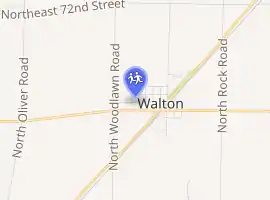Walton Rural Life Center
Walton Rural Life Center is an agricultural charter elementary school in Walton, Kansas, United States,[3][4] and operated by Newton USD 373 public school district. During the 2015–2016 school year, there were 210 students at Walton Rural Life Center.[2] They teach students from kindergarten to 4th grade, and there are two classes for each grade.[2]
| Walton Rural Life Center | |
|---|---|
 Walton Rural Life Center (2010) | |
| Address | |

| |
502 West Main Street [1] , 67151 United States | |
| Coordinates | 38°07′06″N 97°15′40″W |
| Information | |
| School type | Public, Elementary School, Charter School |
| School district | Newton USD 373 |
| Grades | K to 4 |
| Gender | coed |
| Enrollment | 210 [2] (2015-2016) |
| Hours in school day | 8:00AM to 3:10PM |
| Campus type | Rural |
| Website | w-usd373-ks |
History
Walton Public Schools provided elementary, junior high, and high school education for decades before it merged with Newton USD 373 public school district.[4]
In 2006, the Walton Elementary School was converted into the Walton Rural Life Center charter school.
Academics
Walton Rural Life Center is one out of two charter schools that is agriculture based, the other one being a school in Ohio.[3] Walton Rural Life Center also teaches its students about math, science, agriculture, reducing, reusing, and composting.[3]
Walton Rural Life Center was the first public elementary school in the United States to add agriculture to its curriculum. The teachers design projects based on subjects that interest the students. Math, science, and agriculture are the main concepts studied. Instead of reading from a textbook, students experience hands-on learning. The school has farm animals and Kindergarten through fourth graders take turns doing chores and feeding the animals.[5] For example, the students gather eggs, clean them, and check them for cracks. When this is all done, they sell the eggs and decide what to do with the money they earned. The school also has a greenhouse where the students grow flowers, plants, and vegetables.[6]
Film
Using Agriculture to Spur Achievement : The Walton 21st Century Rural Life Center,[7] 2011, U.S. Department of Education filmed a documentary at the Walton 21st Century Rural Life Center charter elementary school in November 2010.[8] The crew also interviewed farm families, teachers, students, and community members. The resulting video will be featured on their website, highlighting the center as a best practices model of innovation in education.[9][10]
References
- Geographic Names Information System (GNIS) details for Walton Rural Life Center; United States Geological Survey (USGS); October 24, 2008.
- "Video: Sunflower Journeys 2808 | Watch KTWU Sunflower Journeys Online | KTWU/Channel 11 Video". watch.ktwu.org. Retrieved 2016-05-13.
- Murphy, Kevin (2013-02-16). "Farm Theme Boosts Enrollment in Rural Kansas School." Reuters.com. Retrieved 2016-04-24.
- Meyer, Gene (2013-06-05). "At this Kansas school, Ag Leads the Lessons." HarvestMedia.org. Retrieved 2016-04-24.
- Attoun, Marti (2013-08-27). "Reading, Writing & Farming." AmericanProfile.com. Retrieved 2016-05-16.
- U. S. Department of Education (2011-01-19). "Using Agriculture to Spur Achievement - The Walton 21st Century Rural Life Center." Online video. Youtube.com. Retrieved 2016-04-24.
- Using Agriculture to Spur Achievement : The Walton 21st Century Rural Life Center; U.S. Department of Education; YouTube.com; January 2011.
- Walton School Focus Of U.S. Dept. Of Education Documentary; Craig Andres; KSN; November 9, 2010
- Rural Kansas Charter School Featured In US Film; Amy Bickel; The Hutchinson News; November 10, 2010
- National Crew Films At Walton Ag School; Cristina Janney; The Newton Kansan; November 18, 2010
External links
- Official website
- USD 373, school district for Newton, North Newton, Walton
- USD 373 School District Boundary Map, KDOT
- Articles
- Walton school's growing pains - Hutchinson News - February 12, 2017
- Murky future: Walton school - The Kansan - February 2, 2017
- Editorial: Walton needs a little love - The Kansan -January 28, 2017